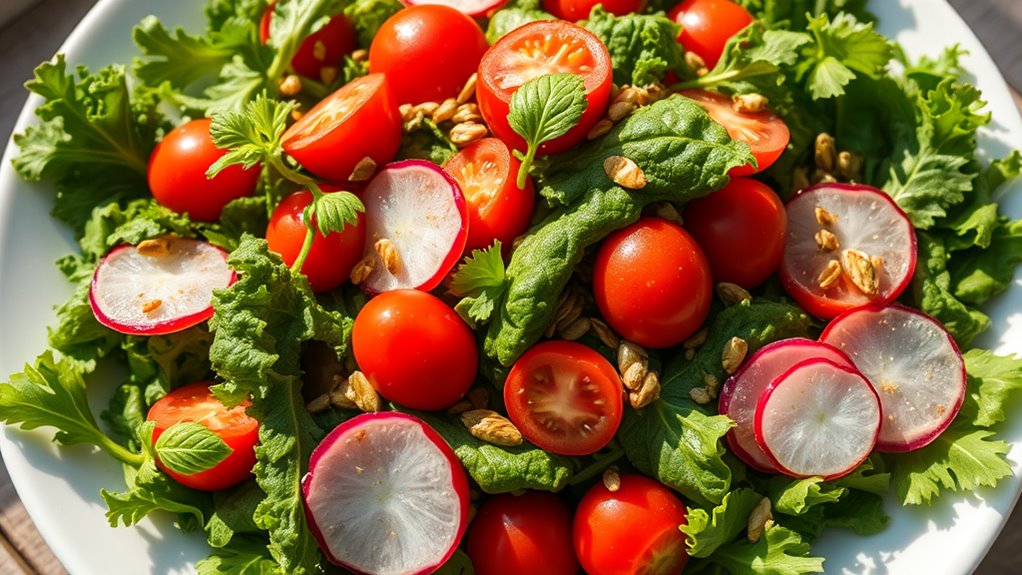What to Add to Your Plate After a Weekend of Overeating
After a weekend of overeating, focus on hydrating foods like cucumbers and watermelon to restore your body’s balance. Add fiber-rich options like apples and quinoa to aid digestion. Don’t forget lean proteins such as chicken or fish to support muscle recovery. Incorporate anti-inflammatory ingredients like leafy greens and berries to promote overall health. For snacks, try hummus with veggies or Greek yogurt with fruit to curb cravings. There’s more to discover about optimizing your plate for recovery.
Hydrating Foods to Replenish Your Body
When you’ve overeaten, your body may feel sluggish and dehydrated, but hydrating foods can help restore your balance. Foods like cucumbers, watermelon, and oranges are excellent post-overeating recovery foods. They’re rich in water content and provide essential vitamins. Incorporating these foods into your meals can promote hydration, support digestion, and give you the energy boost you need to feel revitalized. Additionally, including citrus fruits for vitamin C can enhance your skin health while aiding in recovery.
Fiber-Rich Options for Digestive Health
Incorporating fiber-rich foods into your diet can greatly enhance your digestive health after overeating.
Start by adding whole grains like brown rice or quinoa, and don’t forget fruits and vegetables such as apples, broccoli, and lentils.
These options help regulate your digestion and promote a healthier gut. Aim for at least 25 grams of fiber daily to support your recovery. Including high-fiber fruits like pears and strawberries can further improve digestion and reduce bloating.
Lean Proteins to Support Muscle Recovery
After indulging in a large meal, your body may benefit from adding lean proteins to your plate to assist with muscle recovery. Options like chicken breast, turkey, and fish provide essential amino acids to help repair tissues. Including these choices can enhance your recovery and support your fitness goals. Additionally, incorporating omega-3 rich foods can further nourish your body and improve overall health.
| Lean Protein | Protein Content (per 100g) |
|---|---|
| Chicken Breast | 31g |
| Turkey Breast | 29g |
| Salmon | 25g |
| Tofu | 8g |
| Lentils | 9g |
Anti-Inflammatory Ingredients for Balanced Nutrition
To maintain a balanced diet and counteract the effects of overeating, consider integrating anti-inflammatory ingredients into your meals. Incorporate foods like leafy greens, berries, and fatty fish rich in omega-3s. Spices such as turmeric and ginger can also bolster your meals’ anti-inflammatory properties. These choices not only promote overall health but also help restore balance and support your recovery after a weekend of indulgence. Adding leafy greens to your meals can provide essential nutrients and antioxidants that enhance detoxification and support skin health.
Nutrient-Dense Snacks to Curb Cravings
While it’s easy to reach for sugary or processed snacks when cravings hit, choosing nutrient-dense options can keep you satisfied and help you regain control. Try hummus with carrot sticks, Greek yogurt topped with berries, or a handful of nuts. These snacks provide protein, fiber, and healthy fats, stabilizing your blood sugar and reducing the urge to overindulge again. Additionally, incorporating nutrient-dense foods into your meals can further enhance your recovery and support overall wellness.

